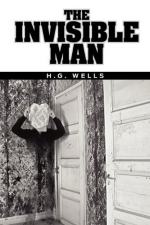Her visitor, she saw as she opened the door, was seated in the armchair before the fire, dozing it would seem, with his bandaged head drooping on one side. The only light in the room was the red glow from the fire—which lit his eyes like adverse railway signals, but left his downcast face in darkness—and the scanty vestiges of the day that came in through the open door. Everything was ruddy, shadowy, and indistinct to her, the more so since she had just been lighting the bar lamp, and her eyes were dazzled. But for a second it seemed to her that the man she looked at had an enormous mouth wide open—a vast and incredible mouth that swallowed the whole of the lower portion of his face. It was the sensation of a moment: the white-bound head, the monstrous goggle eyes, and this huge yawn below it. Then he stirred, started up in his chair, put up his hand. She opened the door wide, so that the room was lighter, and she saw him more clearly, with the muffler held up to his face just as she had seen him hold the serviette before. The shadows, she fancied, had tricked her.
“Would you mind, sir, this man a-coming to look at the clock, sir?” she said, recovering from the momentary shock.
“Look at the clock?” he said, staring round in a drowsy manner, and speaking over his hand, and then, getting more fully awake, “certainly.”
Mrs. Hall went away to get a lamp, and he rose and stretched himself. Then came the light, and Mr. Teddy Henfrey, entering, was confronted by this bandaged person. He was, he says, “taken aback.”
“Good afternoon,” said the stranger, regarding him—as Mr. Henfrey says, with a vivid sense of the dark spectacles—“like a lobster.”
“I hope,” said Mr. Henfrey, “that it’s no intrusion.”
“None whatever,” said the stranger. “Though, I understand,” he said turning to Mrs. Hall, “that this room is really to be mine for my own private use.”
“I thought, sir,” said Mrs. Hall, “you’d prefer the clock—”
“Certainly,” said the stranger, “certainly—but, as a rule, I like to be alone and undisturbed.
“But I’m really glad to have the clock seen to,” he said, seeing a certain hesitation in Mr. Henfrey’s manner. “Very glad.” Mr. Henfrey had intended to apologise and withdraw, but this anticipation reassured him. The stranger turned round with his back to the fireplace and put his hands behind his back. “And presently,” he said, “when the clock-mending is over, I think I should like to have some tea. But not till the clock-mending is over.”
Mrs. Hall was about to leave the room—she made no conversational advances this time, because she did not want to be snubbed in front of Mr. Henfrey—when her visitor asked her if she had made any arrangements about his boxes at Bramblehurst. She told him she had mentioned the matter to the postman, and that the carrier could bring them over on the morrow. “You are certain that is the earliest?” he said.




